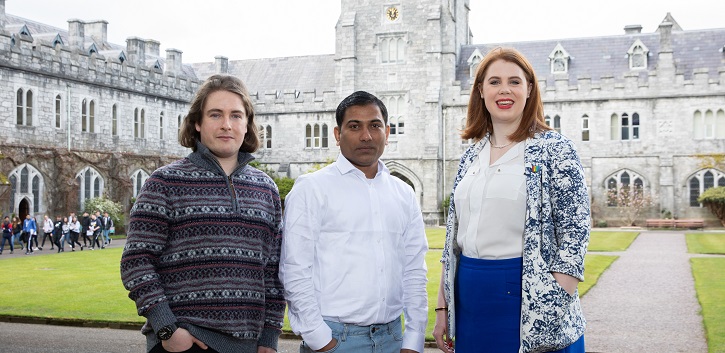Three UCC scientists to represent Ireland at Meeting of Nobel Laureates

Three early-career scientists from the Tyndall Institute, UCC – Niamh Kavanagh, Dr Christopher A. Broderick and Dr Vijaykumar V. Jadhav – have been selected to represent Ireland at the 69th Lindau Nobel Laureate Meeting this summer.
Selected by the Irish Research Council, the scientists will meet up to 40 Nobel Prize-winners including the 2018 laureates in physics Donna Strickland and Gérard Mourou at the prestigious conference. They will be among almost 600 young scientists from 88 countries, selected based on the excellence of their respective track records.
The focus of this year’s Meeting, which will take place in Lindau, Germany, from June 30 to July 5, will be cosmology, particle physics and quantum technology.
A photo from the fantastic awards ceremony yesterday highlighting the achievements of the 3 @UCC @TyndallInstitut researchers on being selected for the 2019 @lindaunobel. @NiamhTalking90 @Vijay23031987 @anita_maguire @jocelynburnell @IrishResearch pic.twitter.com/REExCyiPIy
— UCC Research (@UCCResearch) May 3, 2019
Impressive emerging Irish scientists getting due recognition for their work in cosmology, particle physics, quantum technology and energy storage @UCC @tcddublin @UL_Research @scienceirel https://t.co/mhKtBOSJaR via @IrishTimes
— Kevin O'Sullivan (@KOSullivanIT) May 3, 2019
5 young scientists to represent Ireland at major Nobel prize meeting - three of whom are from @TyndallInstitut UCC!
— UCC Ireland (@UCC) May 2, 2019
Congratulations Dr Christopher A. Broderick, Dr Vijaykumar V. Jadhav and Niamh Kavanagh. https://t.co/LslIbeE8NY via @siliconrepublic
The five scientists selected to represent Ireland comprise researchers based at University College Cork, the University of Limerick, and Trinity College Dublin. Their nominations were assessed by the Council and subsequently selected by the Lindau Nobel Laureate Foundation following a rigorous and independent evaluation process.
The successful candidates are:
- Niamh Kavanagh, from the Tyndall Institute at University College Cork, whose research focuses on designing, building and optimising an optical communications system to provide alternatives for future high-capacity, high-speed internet growth;
- Dr Christopher A. Broderick, also based at the Tyndall Institute, at University College Cork, who works on condensed matter theory and computational physics;
- Dr Sarah Guerin, based at the Bernal Institute at University of Limerick, who is developing molecular modelling tools to predict electronic structures and certain responses of molecular crystals;
- Dr Adam Kelly, a nanoscientist at Trinity College Dublin, whose research focuses on developing printed electronics from solution-processed 2D materials; and
- Dr Vijaykumar V. Jadhav, based at the Tyndall Institute at University College Cork, whose research focuses on the field of energy storage and material physics.
UCC has a particularly strong track record in this programme over many years, with eight successful awardees for Lindau from 2014-2018, an impressive figure testament to UCC Research Officer Dr Louise Burgoyne’s proactive engagement.
Commenting today (May 2) at an awards ceremony to mark the selection, Peter Brown, Director of the Irish Research Council, said: “The annual Lindau Nobel Laureate meetings are a unique opportunity for the next generation of scientists to interact with some of the world’s most accomplished scientists.
“The Lindau Foundation partners with science and research agencies worldwide to identify talented early-career researchers to attend. We are delighted to be Lindau’s Irish partner, and to support five scientists from Ireland to attend the event this year. This is an excellent opportunity for very promising scientists – who are at the formative stages of their careers – to develop links and exchange ideas, both with their peers and with Nobel Laureates in their fields.”
We are delighted to have Dame Jocelyn Bell Burnell joining us today to present the awardees and recognise their achievements #LoveIrishResearch pic.twitter.com/7WcAUPVjaO
— IrishResearchCouncil (@IrishResearch) May 2, 2019
